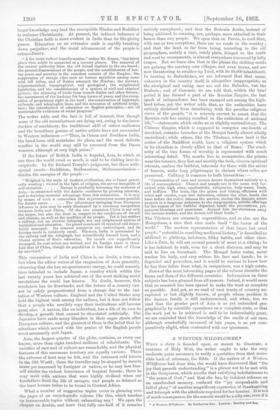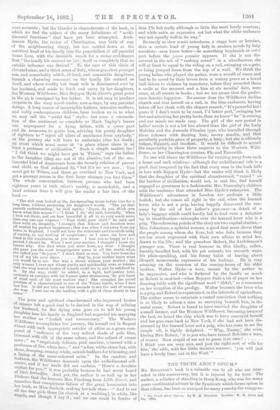A WESTERN /WILDFLOWER.*
WIIEN a story is founded upon, or meant to illustrate, a sentence of Holy Writ, the writer ought to take the very moderate pains necessary to verify a quotation from that acces- sible book of reference, the Bible. If the author of A Trestern. Wildflower had done this, she would have discovered that "the joy that passeth understanding" is a phrase not to be met with in the Scriptures, which ascribe that satisfying indefiniteness to "the peace of God ;" and that she has, by indolent reliance on an unrefreshed memory, confused the " joy unspeakable and full of glory" of another magnificent expression of thanksgiving and triumph with the attribute required for her heroine. It is not of much consequence, for the conceit would be a silly one; even if it
* A Weeturn Wildflower. By Katharine Leo. London : Bentley and Ben.
were accurate ; but the blunder is characteristic of the book, in which we find the oddest of the many definitions of " archi-
diaconal functions" that have yet been attempted. Arch- deacon Hyde, the rector of Charrington, sees little of any of. the neighbouring clergy, but has settled down as the martinet head of his family into the peacefullest of all peaceful home lives, with the desirable result for a rector-archdeacon that "the family life centred on [sic] itself so completely that no
outside influence was desired." To the care of this cleric of elevated aims, and a strict sense of duty, whose graceless younger son, and remarkably selfish, ill-bred, and unamiable daughters, furnish a charming comment on the family life centred on itself, and whose worthy but weak wife is domineered over by her husband, and made to fetch and carry by her daughters, the Western Wildflower, Miss Rejoyce Hyde (there's great point in the y), is consigned by her father. It is not easy to produce surprise in the wary novel-reader, now-a-days, by any parental doings. A long course of incorrigible fathers, intrusive mothers, and nobly contemptuous children, have broken us in to what we may call the awful dad" style ; but even a renuncia- tion of the sentiment as complete as Mark Tapley's leaves one unprepared for a dying father, with a queer past and its memories to guide him, advising his pretty daughter of eighteen to " reject all offers of assistance from anybody," on the journey she will have to undertake after his death ; an event which must occur at " a. place where there is at least a pretence of civilization." Such a simple matter, too !
" I did think we might have got to 'Frisco," says the father to the daughter (they are not of the abusive, but of the sen- timental kind of departures from the homely relation of parent and child, as God ordained it), " but it's no use now. You must get to 'Frisco, and there go overland to New York, and get a passage across in the first large steamer you find there." The whole conversation, between persons who had been eighteen years in each other's society, is remarkable, and a brief extract from it will give the reader a fair idea of the book :— " The sick man looked at the far-spreading scene before him for a
long time, without answering his daughter's words. The joy that passeth understanding,' be said again; Joyce, do you think you know what this means 1"—` I think I do,' she said, hurriedly, ' when I look out there, and see how beautiful it all is, so very much more than any one can express.'—' Poor child, poor child he said, and then went on, dreamily, 'I thought that Nature and freedom were all needed for perfect happiness ; that was when I ran awoy from my home in England. I could not bear the restraints and the artificiality of society, to say nothing of suspicions ; so I came out here and lived in the mountains, as you know. I was not so happy as 1 ex- pected I should he. When I met your mother, I thought 1 know the reason why. She died when you were bore, my dear. 1 thought she gave you the most inappropriate name in all the world, when she called you "Rejoyce." I don't think so now. You have boon the icy of my life ever since Ilfay be, your mother know what YOU would be to me. She was a clever woman, your mother ; the only woman I over saw whose purity and spirituality were so intense that the very lowest brutes of miners could see it, and be subdued by lb. By the way, child,' he added, in a light, half-jesting tone, curiously at variance with his former quiet dreaminess, 'do you know of wbat rank of life your mother was ? She occupied the proud position of a chambermaid at one of the 'Frisco hotels, when I first saw her, It did not take me three seconds to see the sort of woman she was. I met her on the landing, with a pile of clean shoots in her arms.° " The pure and spiritual chambermaid who impressed brutes of miners left a good deal to be desired in the way of refining her husband, for the dying man goes on to tell his young daughter how his family in England had regarded his marrying her mother as " foolish and unnecessary," The 'Western Wildflower accomplishes her journey, fits herself out in Regent Street with such appropriate articles of attire as a gown com- posed of "cashmere of the very softest shade of pale blue, trimmed with silk of the same colour, and the softest of cream laces , " an " exquisitely delicate, pink cambric, trimmed with a profusion of fine, white lace ; " and " a fine, white-straw hat, with three, drooping, creamy-white, ostrich feathers for trimming, and a lining of the same-coloured satin." In the cambric and feathers, the Wildflower descends upon the archidiaconal self- centre, and if her uncle did not exclaim, " Here's a desolate orphan for you !"
of Dick S wivellit was probably because he had never heard
ess And yet, the author is so well up in her Dickens that she borrows Mrs. Pinching from .Little Dorrit, an d transfers that conspicuous failure of the great humourist into her book, as Miss Sackett, making her talk thus :—•" And to see all the dear girls there [in church at a wedding], in white, like angels, and though I say it; and no one could be fonder of
dear Flo but really although so little the most lovely creature; and white satin so expensive not but what the white cashmere was not equally well in its way." So surely as slow music introduces a stage hero or heroine, does a certain kind of young lady in modern novels by lady novelists—men know better—do something hoydenish or outrre
just before the jettne premier appears. If she is not dis- covered in the act of " rushing round" in a wheelbarrow, she
will at least be equal to the riding on a rail, swinging on a gate, or being jumped down from the top of a wall. We think the young ladies who played the guitar, wore a wreath of roses, and had to be saved by their lovers from a watery grave or a bored bull driven to violence by monotony, before they accorded them a smile at the moment and a kiss at six months' date, were nicer, at all events in books ; but we are aware that the prefer- ence denotes fogeyism. No sooner does the Wildflower decline church and seat herself on a rail, in the blue cashmere, having taken off her cloak with the elegant remark," It's powerful hot! guess if I don't want to be roast, I'd better peel," swinging her feet and admiring her pretty boots, than we know " he "is coming, and our minds are made easy. The girl of the new period in ladies' novels is not a bit less absurd than the girl of the Lady Malvina and the Amanda Fitzalan type, who travelled through three volumes with floating hair, snowy muslin, and that peculiarly portable piece of property, a harp ; but she is. odiously vulgar, flippant, and insolent. It would be difficult to accord the superiority in these three respects to the Western Wild- flower, or her Charrington cousins, Flo and Eanswith.
No one will blame the Wildflower for running away from such a home and such relatives—although the archidiaconal rule is a good deal tempered by the fact that every man in the book fulls in love with Rejoyce Hyde—but the reader will think it likely that the daughter of the spiritual chambermaid, "raised " on the borders of civilisation, would not, in real life, find herself engaged as governess to a fashionable Mrs. Ponsonby's children with the readiness that attended Miss Hyde's enterprise. The Wildflower's adventures in London are perhaps a little foolish; but she comes all right in the end, when the learned lover, who is not a prig, having happily discovered the run- away by the aid of her father's • gun-ease—a detail of a lady's baggage which could hardly fail to lead even a detective up to identification—triumphs over the learned lover who is a prig. The redeeming points of the story are two capital studies,— Mrs, Johnstone, a spiteful woman, a good deal more clever than the people among whom she lives, but who fails because they are too much engrossed with their own affairs to mind her, drawn to the life ; and the graceless Robert, the Archdeacon's younger son, There is real humour in this kindly, sullen, harshly-handled lout, with his pet animals, his uncouth ways, his plain-speaking, and his funny habit of leaving about ill-spelt memoranda expressive of his feelings. IIo is very amusing on the occasion of the coming-home of his elder brother, Walter Hyde—a bore, meant by the author to• be impressive, and who is flattered by the family as much as Robert is snubbed—when Rejoyce finds a bit of paper on her dressing-table with the significant word fikkel," as a comment on her reception of the prodigy. Walter becomes the lover who a prig, and Robert is expatriated, in the interests of agriculture. The author seems to entertain a rooted conviction that nothing is so likely to reform a man as marrying beneath him, in the social sense. Robert is found to have married the daughter of a small farmer, and the Western Wildflower, becoming aware of the fact, on board. the ship which was to have conveyed herself and her gun-case back to New York, if she had not been dis- covered by the learned lover not a prig, who has come to see the- couple off, is highly delighted. "' Why, Nanny,' she cries, kissing Mrs. Robert, it is you who have turned Bob into a man, of course. How stupid of me not to guess it at once t . I think you are very nice, and just the right sort of wife for him,' she adds, with her little, decisive manner ; you will just have a lovely time, out in the West.'"































 Previous page
Previous page